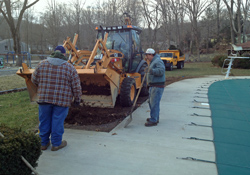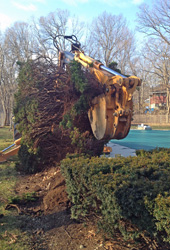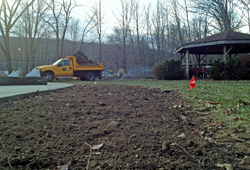Sloatsburg — They lived placidly through the turbulent Nixon White House years and made it through disco and punk rock. They survived spandex, shoulder pads and big hair fashion of the 1980s. They outlasted nearly 20 Sloatsburg Fire Chiefs and withstood the tenure of former Sloatsburg Building Inspector John Layne. Neither Hurricane Floyd flooding in 1999 or Tropical Storm Irene this past August could uproot them. Impervious to all weather, they grew and guarded swimmers from view. They provided ample dwelling space to generations of rats and other like-minded vermin, as well as obscured prying poolside views for many prank-playing Sloatsburg youth. And now, they’ve been unceremoniously evicted. Gone are the yew bushes that surrounded the Sloatsburg Public Pool since being planted circa 1968.
 Village Trustee Pete Akey called the removal of the bushes a one time extraordinary maintenance effort for health and safety reasons.
Village Trustee Pete Akey called the removal of the bushes a one time extraordinary maintenance effort for health and safety reasons.
“I noticed last year that when you sit down in the grass as a parent and you look toward the pool to watch your child” said Akey, “you can’t see. I couldn’t see the children in the water. As a parent and a member, I felt it was unsafe having the bushes there.”
According to Wikipedia, the Taxus or yew is a slow-growing, long-lived small conifer native to eastern Asia that contains highly poisonous alkaloids. All parts of the bush can be toxic to some animals, humans included, enough so to drop a horse.
 And then there was the matter of a thriving rodent population. The intersection of Nakoma Brook and pool area snacks and lunches became an irresistible environment for rats. “I personally noticed rodents living amongst the bushes,” said Akey. “It was dirty and every morning that I’d go down to that pool, I’d find them dead in the water. I’d see the garbage cans all chewed up. Basically, they were living in those bushes. Between the health aspect of the rodents and the safety aspect of not being able to see the children and people swimming, I thought it would be a good idea to remove the bushes.”
And then there was the matter of a thriving rodent population. The intersection of Nakoma Brook and pool area snacks and lunches became an irresistible environment for rats. “I personally noticed rodents living amongst the bushes,” said Akey. “It was dirty and every morning that I’d go down to that pool, I’d find them dead in the water. I’d see the garbage cans all chewed up. Basically, they were living in those bushes. Between the health aspect of the rodents and the safety aspect of not being able to see the children and people swimming, I thought it would be a good idea to remove the bushes.”
New sewer system construction in The Flats neighborhood over the past several years, digging and channeling, likely dislodged the rodent population, contributing significantly to the growing problem as they sought new nests.
Sloatsburg Superintendent of Public Works Mike DeMartino said he received instructions to remove the bushes a few months back but waited until the recent frosty spell to evict the unwanted yews, which were well rooted around the pool area. DeMartino said it was better to wait for a cold spell to minimize any damage, especially to the underground sprinkler system.
 “I didn’t want to damage the lawn by removing them,” he said. “We had to use the backhoe and a truck to load them out, and the equipment had to go on the lawn. You have to do it when the ground is harder or frozen.” DeMartino said there was no cost to remove the bushes due to the Public Works manpower and equipment. There would be a material cost to re-landscape the area, something that won’t be visited until after a season or so for pool members to get used to the new look.
“I didn’t want to damage the lawn by removing them,” he said. “We had to use the backhoe and a truck to load them out, and the equipment had to go on the lawn. You have to do it when the ground is harder or frozen.” DeMartino said there was no cost to remove the bushes due to the Public Works manpower and equipment. There would be a material cost to re-landscape the area, something that won’t be visited until after a season or so for pool members to get used to the new look.
DeMartino pointed out that he was keeping the ancient-looking, weathered and twisted flowering cherry trees that sit like sentinels between the pool and small kids pool. “As bad as they look, they still keep on flowering nicely, so we’re going to leave them for now.”
“There are going to be people who are aren’t happy with the removal, I’m quite sure,” said Akey, explaining that two other village trustees were involved in the decision — Trustees John Bonkoski and Barbara Berntsen. Both Berntsen and Akey share responsibility over pool operation and maintenance.
“I’m not going to convince everybody that it was a great idea,” said Akey. “You can’t get away from the fact that it’s shocking,” he said, referring to the open lawn.
“If you’re not a member of the pool I’ll explain the safety factor,” he said. “I haven’t seen too many other places around the county or state that have bushes obscuring the pool. With every decision, there are going to be people who agree and disagree. They might not notice until the spring, when they say, wow, I can finally see my children.”


